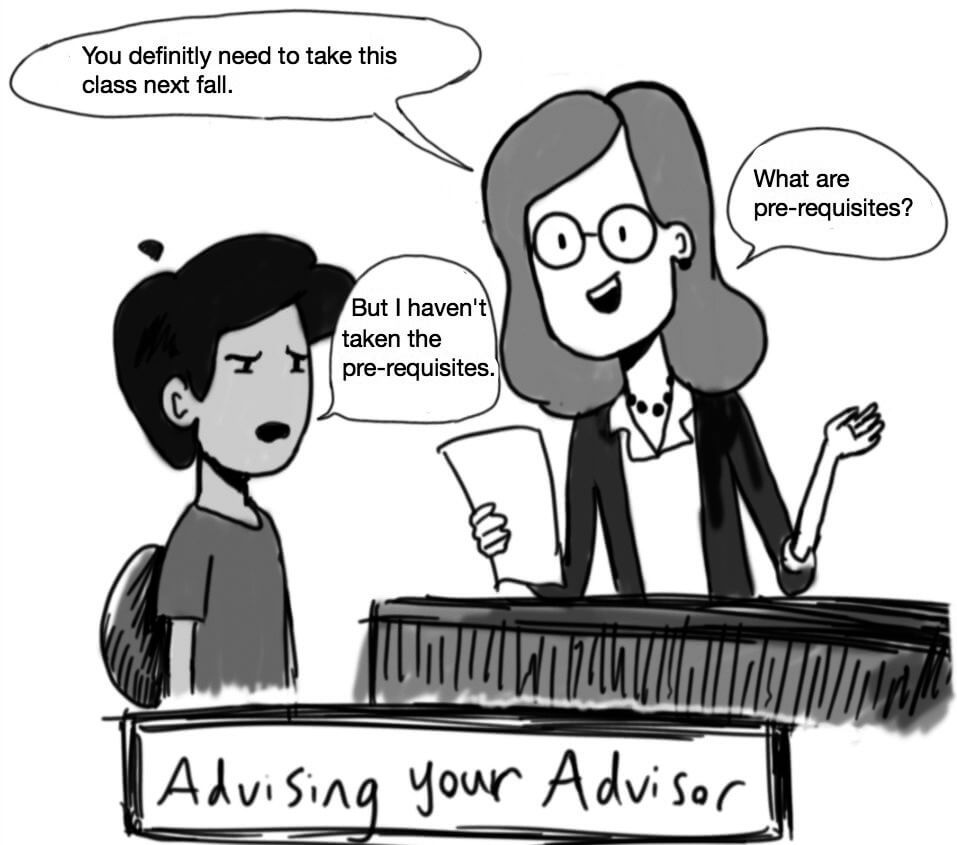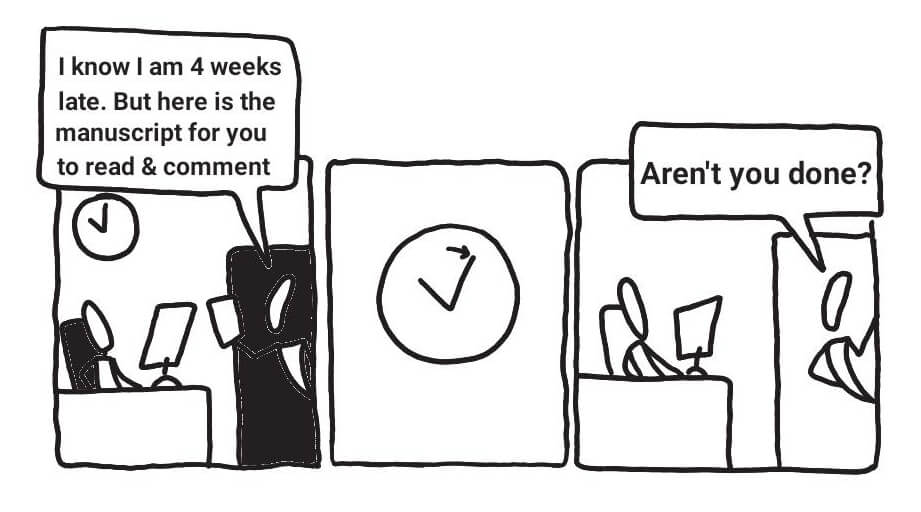Choosing the right Ph.D. advisor for one’s graduate career is the most critical decision that one has to make early in the graduate school. To be concise, often graduate students have to select their advisor even before beginning a graduate program. Unfortunately, graduate students have to make this type of decision when they have least experience and perspective on managing academic relationships. Also, they do not have the experience to think of the right questions before choosing an advisor. Should the join a large group or small one? Is it better to work with a new faculty or experienced one? What will benefit the most? Is the research area is well-established or a new one?
The success of your graduate career is highly influenced by a prolific advisor-advisee relationship, which will ultimately promote your successful career. The quality of mentorship you receive is highly influenced by how well you get along with your faculty advisor. There is common saying in academia “An advisor will either make your life or break you”. Therefore, it is highly critical that you select the right advisor for you. Furthermore, your success as a graduate student is also dependent upon the relationships with your lab members. The lab members are the first resort to whom you will seek for help for your daily research activities. If they are not welcoming enough and do not possess the spirit of growth mindset, it is very difficult to build a successful graduate career in the lab.
Here, in this article, we are trying to provide a framework that a graduate student can use to select an advisor for his/her graduate career.
Onboard and Training:
What type of training I will get? Who will train me? These two questions that you should ask first to your potential Ph.D. advisor. To successfully accomplish any research projects, one should have particular skill sets or have training on certain type of instruments or experimental setup. Though a graduate students should have the ability to teach him/herself, but at the initial phase you will need good training. Usually, the senior lab members or postdocs train a graduate student. In some lab, the professor takes
charge of the training. Some larger groups have multiple postdocs, and they are responsible to give you the trainings. As long as you are being well trained, any format is fine. Your job is to communicate properly with the advisor about the training activities.
For example, how confidently you can operate a particular instrument after receiving training. Or, can you do certain type of experiments independently. If you are not getting the training in the right way, you should always convey this message to your Ph.D. advisor. After the training periods, the advisor expect you to take the lead of a project, and work independently onwards. Therefore, it is your duty to make
sure that you are getting the training in the right way.

How often will you see your PhD advisor?:
The common practice of any research group is to have a weekly meeting where the lab members present their progress and discuss about the research issues with their advisor. However, apart from the group meeting you might feel the need of having a sit down meeting once in every month with your advisor to discuss about all the issues that you are facing. Having such type of meetings during the early stage of your graduate career are often fruitful. Sometimes you might need some active help or directions from your advisor. Will the advisor be available to meet such type of needs of yours? You also need to find out that.
In large research groups, students barely find their advisor available for such type of meetings. Usually the postdoc or the most senior lab members come often for the rescue. You need to make sure the lab you will be joining have such kind of mechanism so that you are not stuck with a particular problem for months.

Publication culture of the lab:
Ph.D. program is research intensive. You should finish your research projects in a timely manner. Then write your own paper and take in charge of submitting it after the necessary corrections. Sounds simple, isn’t it! Not every research group has the similar research culture. Some Ph.D. advisors often aim for publishing their work in high impact factor journals. Perhaps they will not choose any journal whose impact factor is below five. Yes, it is always desirable to publish high impact factor journals, but not all of your work will make through it. Therefore, if you work in such a group, there are high chances that you will have less publications. I have heard a lot of stories where the students were complaining that their advisors were not allowing them to publish their data. Because those work will not make to high impact factor journals.
Some Ph.D. advisor do not even consider publishing in conferences. As an early researcher, you would definitely like to have a good number of papers, and also some high quality papers. The fact is that if you are doing something innovative, or pushing the boundary of your field to some new directions, you are definitely going to submit them in good academic journals. But not all time, you will have innovative work. Sometimes, you will end up doing something with a different methodology. Perhaps, you will end up with not so promising results. Those type of work are work as well. There is no bad data and there is no bad research during your graduate career period. Therefore, before committing to a research group, you should try to identify the research culture of the lab.

Where do alumni of the lab end up?
Always consider joining such a lab that produced alumni who have accomplished similar goals like you after their graduation. If your interest is to be a faculty after your Ph.D. then find such lab where the PI train his/her students to be an academician. Or if you think you will go for industry, then choose such a group which has visible collaboration with industry. Be very careful about the field you will be choosing for your Ph.D. Some fields have a very limited application. If you work in such field, it will be very
difficult to find a good job in industry.
How the Ph.D. advisor will help to achieve your career goal?
Often Ph.D. students ignore this critical factor. Not all advisor will be very supportive so that you can achieve your career goal. I have heard stories about so many PIs who just treat their students as a factory worker. You are only there to produce research results and publish paper for them. They will not even allow you to do an intern. Some PIs will keep their students for longer years because they do not have any students down the pipeline to do the research work or train new students. Some are even worse. They give their students false hope by telling that if they do multiple postdocs they will end up being a faculty. Whereas the truth is that perhaps the student may not possess the necessary qualities to be a faculty.
Always choose a kind person as your advisor:
A football team is as good as it’s coach, so as the Ph.D. students. If you work with a kindhearted and good person, you will be the next one. The culture of academia has evolved a lot, not everything in a good direction. Not all PI will treat you as a human being first. Some of them will expect that because they are paying you, you should keep your head down and grind for 10-12 hrs everyday without any break. Other PIs will measure your work by the number of slides that you present in the meeting. Some will just count the number of hours per slide that you present in the meeting. If they feel that for some week you just slacked a little bit, they will just unleash their anger upon you. Some PIs will give you such a hard time that you will not have enough time to focus on your coursework.
In some group there is no Ph.D. training. It is just like a factory, where you will go at 8 in the morning and do not know when you will be able to call it a day. These unimaginable situations are being normalized now a days. In some universities PIs maintain a cohort so that you can not switch to a different research group. Therefore, it is very crucial for you to find such a Ph.D. advisor who is a kind-hearted and good person. A good and kind-hearted advisor will always help you. For example, if the advisor sees that you do not fit in his/her group, then s/he will help you to find another group. Often it happens that students do not have the required skills or training. Then, the advisor will give ample amount of time to learn those skills. Though as a student you should be professional, but at the end of day we all are trying to bring food to our table. If something goes wrong a good advisor will always try to find the best solution both for you and his/her own research group.

New faculty or experienced Ph.D. advisor?:
It is often easier to get into a newly formed research group, then the established one. However, the opportunities to work with junior scholars are very under-appreciated. First of all, they have just started their academic career, and it takes time to build the reputation of the newly formed research group. Compared to the established or large research groups, it is difficult for the students to build a
strong connection with other people due to lack of academic recognition. But working with new faculty brings unique rewards. For example, new faculties often have an extremely exciting and rapidly expanding research program. Student who will work in new labs will be the part of this journey of pushing scientific borders to a new direction. There are high chances of getting patent or publish high quality of papers that will originate from the research work. Often, new faculties provides hands on training to their students and spend tremendous amount of time to advance the research. Compared to other senior faculty members, they often have many fewer responsibilities. Therefore, the students get a unique chance to learn directly from their advisors, which is a rare case in well established groups. You will also
have the opportunity to learn to build a lab from scratch. This is a unique opportunity that a very few students get in their graduate career.
So, are these considerations the only deciding factors for picking an advisor? Of course not. Because every student has a different priority. Some might find one advisor toxic, whereas other can survive in the lab or graduate. Some does not care how s/he is being treated as long as s/he is producing results. But from my experience I should say that there is difference between just doing a Ph.D. or growing with a Ph.D. If you want to be a great scholar, then you should always work with a great advisor. Always remember that a Ph.D. student is as good as his/her Ph.D. advisor.
Disclaimer: No A.I. was used to generate any portion of this content.


Pingback: How to Choose the Right Grad School in USA? - gradbunker.com
Pingback: How to Succeed in Graduate School? - gradbunker.com
Pingback: Tips to Succeed as a Grad Student ! - gradbunker.com